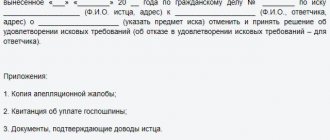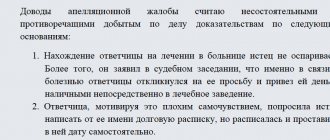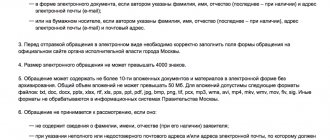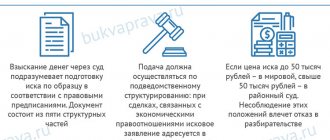Home / Complaints, courts, consumer rights / Litigation
Back
Published: 09/06/2018
Reading time: 5 min
0
236
If any participant in the proceedings is dissatisfied with the verdict, he has the right to appeal this decision. Usually this method is resorted to when the review of the case in the courts of first instance did not give the desired result.
- Cassation appeal against an appeal ruling Who has the right to file a cassation appeal?
- Measure to overturn court verdicts
- General writing rules
According to the Civil Procedure Code of the Russian Federation, any interested person who participated in the meeting and wants to restore his own rights has the opportunity to file a cassation.
Would you like us to develop the same cassation appeal for you?
We provide services for drafting cassation appeals in civil cases and representing interests in cassation courts throughout Russia. If you want to wisely use your chances in the cassation court, please contact us using any of the contacts on the website.
we will find all possible grounds for canceling judicial acts; we will present our position in the complaint in a legally competent manner; we guarantee compliance of the complaint with the requirements of procedural legislation; strict adherence to deadlines.
Contact us in any convenient way: +7-992-011-39-66 (+ WhatsApp, Viber) [email protected]
Sincerely, DobroPravo project team.
Cassation appeal against the appeal ruling
In the event of a violation of interests or an unfair verdict of a court of first or second instance, any citizen may demand the cancellation of the verdict by filing a cassation appeal against the ruling. It is also possible to achieve restoration of rights if this was not possible after filing a claim in the district court or filing a complaint with the appellate court.
Who has the right to file a cassation?
Each participant in the proceedings has the opportunity to restore their interests by appealing the verdict. A cassation appeal can be sent to a higher authority by:
- plaintiff or defendant (that is, parties to a civil case);
- prosecutor;
- third parties;
- persons applying to court for the protection of the rights, freedoms and legitimate interests of other persons or applicants entering the process for the purpose of giving evidence;
- other interested parties in cases of special proceedings and in cases arising from public legal relations.
All these persons act on their own behalf and are direct participants in the court case. Each party has a legal interest in the final verdict of the meeting, while protecting both personal rights and the interests of defenders or third parties.
The rights and obligations of participants in legal proceedings are regulated by Article No. 35 of the Civil Law Code of the Russian Federation. According to its provisions, all persons have the opportunity to:
- get acquainted with the case materials;
- make the necessary extracts or make copies;
- provide evidence;
- submit petitions and so on.
Measure to overturn court verdicts
It is possible to challenge court decisions that have entered into force in cases where there is evidence of a violation of substantive law. Such situations include:
- misinterpretation of legislation;
- application of legislative norms that were not subject to implementation;
- refusal to apply legislative norms to be applied.
Also, court decisions that violate the rules of procedural law are subject to appeal. These include the following cases:
- when the court record of the hearing is not attached to the case;
- if the secrecy of the court conference was not respected;
- the case was heard in an improperly constituted court;
- one of the obligatory persons did not participate in the trial , and his absence is due to proper notification of the date and place of the meeting.
What is indicated in the cassation appeal?
Summarizing the norms of procedural legislation, we can conclude that in general the content of a cassation appeal in all types of proceedings is similar. Let us consider, using the example of a cassation appeal within a civil process, what mandatory data and information should be included in it:
- name of the court (the one to which the complaint is addressed);
- the name and place of residence of the citizen (or the name and location of the organization) who filed the complaint, as well as his status in the process;
- information about other participants in the trial;
- the name of the courts that considered the case as courts of first and appellate instance;
- an indication of the decision made by the court that is subject to verification (with the obligatory indication of the number that was assigned by the court during the initial consideration of the case);
- justification of the position of the person who applied (here it is necessary to indicate why the citizen considers the decision illegal, with references to the relevant regulations);
- a specific request to the court in accordance with its competence;
- a list of all documents attached to the complaint;
- signature of the person or his representative (in the second case, a power of attorney for representation of interests must be attached to the complaint).
It is not difficult to imagine what a cassation appeal looks like based on everything stated above, but for clarity, we offer the simplest example of a cassation appeal.
Feeding features
Cassation appeals are filed against court decisions that have entered into force.
It does not matter whether they were adopted in a criminal or civil case. Both participants in the process and persons whose interests were affected by the decision can submit a paper. The short form, like the full form, is submitted to a higher court, but through the judicial body that previously made the appealed decision. This can be done in person by contacting the court office, or you can send the documents by mail, always by registered mail with a list of attachments.
A short complaint is submitted in one copy. It is advisable to attach to it the original receipt for payment of the state duty, which will be 50% of the amount of the fee when filing a similar claim in the court of first instance. If a person has benefits or is exempt from paying state fees, it is necessary to attach a copy of the document confirming this fact.
There is no need to worry that you will have to waste your money, since you will not have to pay the fee again if you submit an already complete application. If there is a concern that the fee will have to be paid twice, the fee may not be made when submitting a short application, because it will still be left without movement.
If an interested person or participant in the process cannot submit a paper in person, then an authorized person can do this for him.
But for this you need to have in your hands the appropriate power of attorney, certified by a notary. A short cassation appeal is filed against a court decision that has entered into force if a person needs to extend the deadline for filing a cassation appeal. The document is submitted in one copy. It is advisable to attach a receipt for payment of the state fee, which you no longer have to pay when submitting a full application.
Drawing up a complaint
Procedural requirements for a complaint – Art. 378 Code of Civil Procedure of the Russian Federation. In order for a complaint to be accepted for consideration, compliance with them is mandatory.
The complaint must contain:
- Name of the court to which the complaint is sent.
- Details of the person filing the complaint (full name/name, place of residence/location, procedural status). In addition, it is advisable to indicate contact information (telephone, fax, e-mail address) as completely, accurately and correctly as possible in order to receive timely information about the progress of the complaint.
- Data of other participants in the case (by analogy with the applicant).
- Information about all the courts in which the case has already been considered, as well as the content (the main essence) of the decisions made by such authorities.
- List of judicial acts that are appealed in cassation. As a rule, we are talking about a decision of the court of first instance and (or) an appeal decision. In the second cassation (Judicial Collegium of the Supreme Court), the cassation decision can be appealed additionally or independently.
- Listing and content of violations that gave rise to the complaint. Violations must relate to procedural (Civil Procedure Code) or substantive legal norms (civil law). If the complaint is filed by a person who is not a party to the case, then it is necessary to write what the violation of his rights and interests is. In addition to the grounds for the appeal, it is required to indicate what evidence confirms the existence of violations, and provide other arguments that confirm the validity of the complaint and the need to satisfy it.
- A request addressed to the court considering the complaint. Usually we are talking about the cancellation of the appealed judicial act (acts) or amendments to it. Cancellation or change is possible both in full and only in some part. In the latter case, it is necessary to specify what exactly should be canceled or changed by the cassation authority.
- List of attachments to the complaint.
- Date of preparation of the complaint and signature of the applicant.
The attachments must include copies of all decisions in the case, certified by the courts in which they were made. A payment document confirming payment of the state duty must also be attached. In addition, it is advisable to attach the documents that the applicant referred to in the complaint as evidence.
Complaints and applications are prepared in quantities according to the number of participants in the case, plus the main copy of documents for the court. Materials are presented to the court in person (to the court office), sent to the cassation court by mail, or, if possible, through the State Automated System “Justice”.
This is important to know: How long does it take to consider an appeal in a civil case?
Questions and answers on the topic of objections to a cassation appeal in a civil case
Which articles of the Code of Civil Procedure of the Russian Federation provide for the opportunity to object to a cassation appeal?
The provision of objections to a cassation appeal to a cassation court of general jurisdiction is provided for in Part 10 of Article 379.5 of the Code of Civil Procedure of the Russian Federation. In addition, no one has canceled the general provisions of the Code of Civil Procedure of the Russian Federation on adversarialism and equality of rights of the parties (Article 12 of the Code of Civil Procedure of the Russian Federation), on the right to present one’s own arguments and object to the arguments of other persons participating in the case (Part 1 of Article 35 of the Code of Civil Procedure of the Russian Federation).
Is it necessary to respond to a cassation appeal with objections?
Necessarily. If you do not clearly voice your disagreement with the arguments of the cassation appeal, this can easily be used against you. Everything you disagree with should be broken down, criticized, and maybe laughed at









